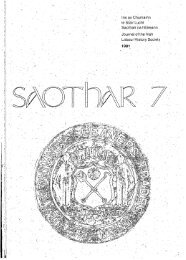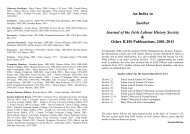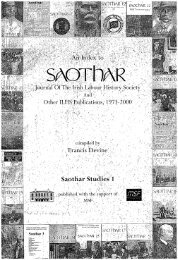84 SAOTHAR 13the Free State. Yet once the new state emerged what increasingly characterises both Labour Party and'social republican' thinking is the need to build a popular alliance to achieve a set of 'national' goalswhich differ little from those of FP. The left critique took the form, not of an assault on Fianna Failobjectives, but rather of the claim that FP had not the capacity to achieve the goals which it proclaimed ..Supposedly this was due to the class nature of the FF leadership: as the manifesto of Saor Eire putit in 1931, it was 'the party of the Irish middle class' .18 However, this characterisation of the party seemsto have had little effect on working class perceptions of it. The unconvincing nature of the left republicancritique, which remained the staple of left analysis for decades, brings us to the heart of the problemof analysing FP. It is a problem of more general significance, for it stems from central facets of thesocialist evaluation of the historic role of the bourgeoisie. In its classical form, this analysis combinedcritique and opposition with an appreciation of the progressive role that the class could play indeveloping the forces of production. In countries where industrialisation came later, and where it waspossible to identify capitalism as a 'foreign' mode of production and its bearers as 'anti-national' , therewas the basis for forms of populist socialism which sought to overleap the capitalist stage ofdevelopment and proceed immediately to a new social order based on the superior traits of nationaltraditions. From this perspective the indigenous middle class was irredeemably consigned to the roleof either comprador or ineffectual foe of the main enemy - 'imperialism'. The a priori logic ofnationalism held sway, especially in its most left wing forms.However, the nationalist project was/is an insatiable one for nations that are small and weak. Noamount of political independence can compensate for the sense of historic injustices perpetrated againstit. In the Irish case the facts of geography reinforced the nationalist's inevitable dissatisfaction withthe meagre fruits of a purely political, and at that partial and truncated, form of independence. Theoverwhelming fact of continued British dominance in economics and culture was at once unacceptableand not easily shakeable. For any small state, the nationalist dream of entry as a full and free individualinto 'the world of nations' can easily transform into the nightmare of inequality and marginalisation- so damaging to the national psyche. The tragedy of such small states is that self-determination canbut slightly compensate for the memories of past wrongs and the realities of continued (relative)powerlessness. This is a tragedy, not for the bourgeoisie, but for the masses; for it is they who willcontinue to bear the brunt of nationalist ambitions.What is being argued here is that the fundamental source of the notion of an 'incomplete nationalrevolution', that profound epistemological obstacle to thinking in a materialist way about Ireland, laynot fundamentally in partition but in the inevitable disj!lncture between the idealist discourse of Irishnationalism (concerned with the 'national being' to the exclusion of material resources) and geopoliticalrealities. Those who treat the nationalist discourse of FP as some superstructural survival tobe eliminated by inevitable modernisation, ignore the profound inequalities in the internationaleconomic order and system of states to which its populist nationalism gives a particular form ofideological expression. Irish backwardness in so many economic, social and cultural spheres, whichcontinued after independence as before, did not undermine the appeal of nationalism. Rather it providedthe continuing material basis for a reconstituted nationalist politics - that ofFF. The hegemony of thatparty can be measured by the fact that its most militant critics from the left challenged not its objectivesbut rather its capacity to attain them given the social composition of its leadership.During the Free State period, the most militant and substantial left critique of FP came from leftrepublicanism, particularl y that expressed by Peadar 0 'Donnell, editor of An Phobiac ht, prime moverin the agitation against the Land Annuities, and articulate champion of a workers' and small farmers'alliance. For O'Donnell the essential revolutionary perspective was encapsulated in the notion ofundoing the 'conquest', that is, not simply removing foreign political domination but also uprootingits implanted and alien mode of production: capitalism. But the class which would be the engine ofchange was, he consistently argued, the small farmers. The urban working class tended to be treatedas a class which had sold its soul for a mess of imperialist pottage. The emphasis on the centrality ofthe small farm population and the need to rouse it through the annuities campaign was an implicit
ESSAYS 85recognition of the impracticality of a revolutionary strategy based on the working class in thecircumstances of inter-war Ireland. The notion that the annuities campaign was the way out of theconservative impasse, the detonator for a revolutionary alliance between town and countryside waswholly chimerical. But strategies that are illusory do not, for all that, necessarily have no effect. Anunintended effect of social republicanism was the creation of a formidable ideological obstruction tothe development of a more realistic socialist strategy which at the same time contributed to theideological resources of FF. For the annuities campaign did, when FF decided to colonise it, make amajor contribution to its radical image in the 1932 election. 0 'Donnell himself has recently mentionedPaddy Hogan, then Minister for Agriculture, claiming that 'de Valera rowed in on the crest of a waveof agitation promoted by the communist Peadar O'Donnell' .19 This was an image based on the pettybourgeois radicalism of rural Ireland, where the large grazier had displaced the landlord as the enemyof the proprietorial ambitions of small farmers and landless men. Such an ideology did not have aninevitable import for the urbanworking class. 0 'Donnell had already noted amongst the working class'a distrust, acynicism' towards the annuities campaign which reflected a feeling that the peasantry were'a hard, mean, clutching, self-centred, self-seeking lot who really want to payout nothing'.20This recognition of a potential rift between rural and urban wings of his revolutionary alliancedemonstrated O'Donnell's capacity for sharp insights within a fundamentally fuzzy and ambiguousconceptualisation of the Irish social order. More importantly, it demonstrates the basis for Fianna Failhegemony in this period. This hegemony had nothing to do with any reputation as a 'left wing' party.The most disturbing elements ofFF policy were those which threatened a degree ofland redistribution,something which alarmed the rural bourgeoisie but represented no threat to the fundamental pattern ofland ownership. Ironically, it was people like de Valera who had least illusions about the fundamentalpassions of the countryside. He had at various times made clear that he was well aware of its capacityfor sectional selfishness. Seeing the essence of the annuities campaign as a demand for petty bourgeoiscomfort, he would have been well aware of its fundamental variance with the objectives of socialrepublicans like O'Donnell.Understanding the hegemony of FF in this period needs no resort to notions of ideologicalmystification. The label 'party of the Irish middle class' hung around its neck by Saor Eire was onlyvery partially true. Of course its ultimate philosophical position was the famous middle way betweenthe extremes of capitalism and communism, a rather threadbare suit of populism and Catholic socialteaching. However its actual operative set of medium term policies for industrial development, housingand welfare could obviously have an appeal to the working class. As significant ideologically was thefact thatFF' s middle class, was still more a potentiality than an oppressi ve presence: as part of a nationalproject of industrialisation it could still be defined as part of the 'people' as opposed for example to thefinancial and mercantile fractions of the bourgeoisie. Therefore a simple class denunciation of FF wasunlikely to have much popular resonance. This was, of course, in part the product of the influence ofCatholicism and the recent clerical denunciations of Saor Eire and other organisations committed to aclass based view of the world. There was also a specifically political factor. Possession of state powerwould allow FF to define itself concretely to the working class as a party that was truly 'national', onethat used power to benefit all the main 'legitimate' interests in the state. Thus although the annuitieswould not be paid to Britain any more, they had, at a reduced level, to be paid to the state, as the farmersheld their land in trust for the nation as a whole. O'DonnelI had favoured the scrapping of annuitypayments altogether as part of his attack on the 'conquest', but this would have appeared to urbanworkers as an unrealistic wager on the radical impulses and wider vision of the peasantry.In the early 1930s the working class was offered three variations, with different inflections ofpopulism and class, on one 'national strategy' by FF, the Labour Party and left republicans. There wasnever any doubt which would be chosen. The Labour Party complained that FF had stolen its policies.This was to miss the point. FF's appeal lay not in this or that piece of social or economic policy, butin identifying itself as the only realistically 'national' party. By attempting to compete with FF a LabourParty which could never hope to appeal to the large constituency of petty bourgeois radicalism that
- Page 1 and 2:
JOURNAL OF THE IRISH LABOUR HISTORY
- Page 3 and 4:
ContentsPageEditorial: Labour Histo
- Page 5 and 6:
EDITORIAL 3freedom to participate i
- Page 7 and 8:
CorrespondenceThe Irish Labour Part
- Page 9 and 10:
; ~ ; ,The Decline and Fall of Donn
- Page 11 and 12:
THE DECLINE AND FALL OF DONNYBROOK
- Page 13 and 14:
THE DECLINE AND FALL OF DONNYBROOK
- Page 15 and 16:
·' THE DECLINE AND FALL OF DONNYBR
- Page 17 and 18:
THE DECLINE AND FALL OF DONNYBROOK
- Page 19 and 20:
THE DECLINE AND FALL OF DONNYBROOK
- Page 21 and 22:
THE DECLINE AND FALL OF DONNYBROOK
- Page 23 and 24:
THE DECLINE AND FALL OF DONNYBROOK
- Page 25 and 26:
,'-,;-''''.A PASSAGE TO BRITAIN 23C
- Page 27 and 28:
A PASSAGE TO BRITAIN 25only in the
- Page 29 and 30:
A PASSAGE TO BRITAIN 27clothing._De
- Page 31 and 32:
A PASSAGE TO BRITAIN 29established
- Page 33 and 34:
;:-.",.- .. .", ...... '.:. '
- Page 35 and 36: LOUIE BENNETI 33feminist movement w
- Page 37 and 38: :... ~: ."
- Page 39 and 40: -.- '.LOUlE BENNETT 37While there i
- Page 41 and 42: LOUIE ~ENNEIT 39Xl's encyclical Qua
- Page 43 and 44: LOUIE BENNEIT 41Bennett's own relat
- Page 45 and 46: LODIE BENNETT 43109; IWWU resolutio
- Page 47 and 48: Essays in ReviewCosherers, Wanderer
- Page 49 and 50: ••• .".'. >. '~"ESSA YS IN RE
- Page 51 and 52: ESSAYS IN REVIEW 49ConnolIy:Myth an
- Page 53 and 54: ESSAYS IN ~EVIEW 51tion' in the Int
- Page 55 and 56: ESSAYS IN REVIEW53International:'I
- Page 57 and 58: REVIEWScontroversy is real history.
- Page 59 and 60: REVIEWSJoe Monks was among the earl
- Page 61 and 62: REVIEWSnolly-Column Song','Proudly
- Page 63 and 64: REVIEWSresulting from the arrival o
- Page 65 and 66: REVIEWS,63the book by means of an a
- Page 67 and 68: REVIEWSlogue, it is hardly surprisi
- Page 69 and 70: The Team For All Workers ...CULIAIB
- Page 71 and 72: ESSAYS 69mission and moral refonn.l
- Page 73 and 74: .. ...... ~.~ -~ .'- '.ESSAYS. 71fr
- Page 75 and 76: ESSAYS 73claimed authority but whic
- Page 77 and 78: ESSAYS 75provided the basis for soc
- Page 79 and 80: ESSAYS 779. For comparisons see E.T
- Page 81 and 82: ESSAYS 7952. Annals of Christ Churc
- Page 83 and 84: ESSAYS' 81Fianna Fail and the Worki
- Page 85: ESSAYS 83Eireann in 1925 visibly di
- Page 89 and 90: ESSAYS 871970, it created the condi
- Page 91 and 92: ESSAYS89The Irish Immigrants' Contr
- Page 93 and 94: ESSAYS" 91Although anti -Catholic p
- Page 95 and 96: ESSAYS 93McCowie played a key role
- Page 97 and 98: :. -,,'.' ',. .~.,:.ESSAYS 95Althou
- Page 99 and 100: ESSAYS 97young girl of their own ba
- Page 101 and 102: SourcesIrish Labour History Society
- Page 103 and 104: SOURCES 101INovember, 1971 to no. 1
- Page 105 and 106: SOURCES 103would claim credit for t
- Page 107 and 108: SOURCES105Sources for Irish Labour
- Page 109 and 110: SOURCES 107NorthWest Archives and L
- Page 111 and 112: SOURCES 109In 1966 the Finnish gove
- Page 113 and 114: TURNINGANEWLEAFThe CPSSUis the larg
- Page 115 and 116: REMINISCENCE 113us due to my politi
- Page 117 and 118: REMINISCENCE 115when Jim was presen
- Page 119 and 120: REMINISCENCE 117of Dail Eireann. 17
- Page 121 and 122: REMINISCENCE 119NotesThe above arti
- Page 123 and 124: DOCUMENT STUDY 121James Connolly in
- Page 125 and 126: DOCUMENT STUDY123SOCIAL DEMOCRATIC
- Page 127 and 128: DOCUMENT STUDY 125proletariat of th
- Page 129 and 130: DOCUMENT STUDY 127the support of Je
- Page 131 and 132: DOCUMENT STUDY 12926. The Workers'
- Page 133 and 134: 131BibliographyA Bibliography of Ir
- Page 135 and 136: BIBLIOGRAPHY 133Compton, P.A. Demog
- Page 137 and 138:
BIBLIOGRAPHY 135Levine, I. and Madd
- Page 139 and 140:
BIBLIOGRAPHY 137Turner, M. 'Towards
- Page 141 and 142:
BIBLIOGRAPHY 1394. Land and Agricul
- Page 143 and 144:
BIBLIOGRAPHY 141Clogher Record12 (2
- Page 145 and 146:
BIBLIOGRAPHY 143Political Research
- Page 147 and 148:
BIBLIOGRAPHY 145Pres, 1987.O'Brien,
- Page 149 and 150:
147Notes on Contributorsf onathanBe
- Page 151 and 152:
1901: Ireland's first general union
- Page 153 and 154:
ELECTRICAL TRADES UNION .Establishe





